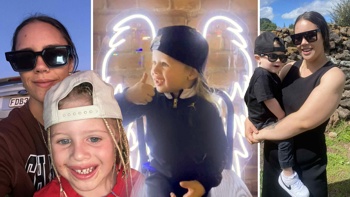

A man who stabbed a teenager to death at a party for kissing his ex-girlfriend has been grilled over his Facebook posts in the lead-up to the murder while making a bid for early release from prison.
Theodore Derrick-Hardie was described as being obsessed with knives at his trial in 2012 where he was sentenced to life in prison with a minimum non-parole period of 11 years for the murder of 18-year-old Warren Rosillo.
In the months leading up to the murder Derrick-Hardie made posts on Facebook about being “born to kill” and wanting to stab someone.
In one incident, prior to Rosillo’s murder, he pulled a knife on a teenager at a party who then ran away while in another he went armed with a machete to meet a girl.
In his second appearance before the New Zealand Parole Board, after becoming eligible for early release for the first time last year, he was questioned extensively about his Facebook posts and he claimed he’d thought they were funny at the time.
“I don’t know why I thought it was okay to talk like that because I don’t talk like that now,” he said.
“I said those things thinking they were just a laugh, acceptable or even entertaining.”
However, board chair Sir Ron Young said the comments were much more than just idle teenage threats.
“Talking about killing someone, talking about how you’re a dangerous person, about murdering someone … Then you buy a knife and threaten to slice a woman’s throat, and a week later you stab someone to death,” he said.
“These are not the immature ravings of a boy on social media. You carried out the threats of murdering someone with a knife.
“That’s why it’s worrying, you did it.”
Derrick-Hardie responded by saying that the “poor choices” he made put him in difficult situations.
“It’s a bit more than a poor choice to stab someone to death,” Sir Ron countered.
Following those Facebook posts one evening in late July of 2011, Derrick-Hardie was at a birthday party in the Auckland suburb of Pakuranga where his ex-girlfriend was also present.
The girl, whose name was suppressed by the courts, had been talking to Rosillo throughout the evening before Derrick-Hardie asked her to leave with him.

Warren Rosillo (left) was stabbed to death by Theodore Derrick-Hardie, who convicted of the teen's his murder.
She agreed but when an argument broke out between them, Rosillo stepped in to intervene.
Derrick-Hardie accused his ex-girlfriend of being unfaithful and she responded by kissing Rosillo.
In response, Derrick-Hardie grabbed Rosillo by the neck and stabbed him in the chest, face and abdomen. Friends and paramedics attempted to keep Rosillo alive but he died at the scene.
Following the attack Derrick-Hardie fled the scene and booked himself into the Heritage Hotel in downtown Auckland before being arrested by police the following day.

Warren Rosillo.
Derrick-Hardie’s remorse, or lack of it, was a theme of his sentencing after he wrote a letter to the judge saying how sorry he was for the stabbing, only to be photographed outside court pulling the fingers at a New Zealand Herald photographer.
“In my view, that points to the lie of the remorse that you now express,” Justice Edwin Wylie said of Derrick-Hardie’s behaviour.
Remorse was again the theme of his second parole hearing held earlier this week where Derrick-Hardie told the board he had accepted responsibility for the murder.
“I realised that I had kind of played down my involvement in my mind,” Derrick-Hardie told the board on Monday.
He said that in the last few years, he’d finally read the sentencing notes and summary facts attached to his case.
“I was shocked by how I came across … it was quite awful to read,” he said.
“It’s not nice to be reminded of how I acted and where my mindset was at the time.

Theodore Derrick-Hardie outside court in 2012. Photo / NZME
“Twelve years is a long time … I was very young. The more I look back on the person I was it’s so different to who I am now.”
Derrick-Hardie identified that on his eventual release being open with anyone he gets into a relationship with about his offending would be crucial to mitigating another high-risk situation.
“Dealing with stress and feeling humiliated, was a big cause of why I lashed out. I had an inability to deal with my emotions,” he told the board.
“I think in my mind I kind of catastrophised things … my relationship with her and being treated like that I think got to me personally at the time.”
Upon his eventual release, Derrick-Hardie said he had a job offer and a place to live and wanted to continue his studies in computer coding.
His support people said he had come a long way since being imprisoned and that his whole outlook had changed from that of a teenager to an adult.
The board declined Derrick-Hardie’s release and said they would like to see him do some supervised work outside the wire as well as an independent psychological report. They will see him again next year.
Jeremy Wilkinson is an Open Justice reporter based in Manawatū covering courts and justice issues with an interest in tribunals. He has been a journalist for nearly a decade and has worked for NZME since 2022.

Take your Radio, Podcasts and Music with you









